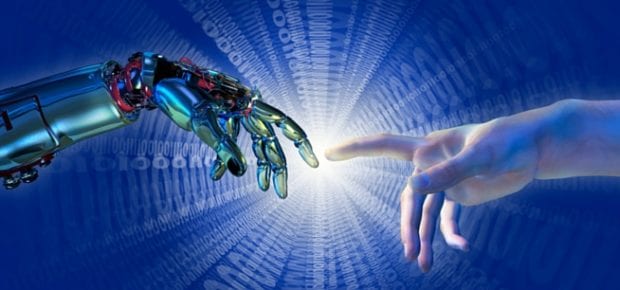July 22, 2016
Both the artificial intelligence (AI) and robotics fields are expanding rapidly with exciting innovations being built to automate our world. There are many questions about the future of robotics and how robots will integrate and interact with humans. Zhi-Hua Zhou, IEEE Fellow and chair of the IEEE Computational Intelligence Society Data Mining Technical Committee is an IEEE expert from China on robotics, and shares his insight on the future impact of AI and robots.
IEEE Transmitter: How intelligent are robots today and how much smarter will they become?
Zhou: As robotics is a comprehensive subject, it’s difficult to measure “how intelligent robots are.” In some fields, for example, voice recognition and visual recognition, robots today have already obtained similar or even better capabilities compared with human beings. However, in terms of understanding context and responding to complex situations, robots still have a long way to go.
IEEE Transmitter: Will robots be able to learn anything, show an ability to reason or even formulate original ideas?
Zhou: Current intelligent robots are capable of learning and reasoning. They are already equipped with autonomic learning ability through data collection and analysis from surrounding environment. So I think robots have the ability to reason. It’s difficult to define whether they can think independently, in cases of reasoning and formulating ideas.
IEEE Transmitter: How do you think AI will most benefit humanity?
Zhou: They can help humans to accomplish more and more tasks. The main goals of AI development are always dedicated to liberating humans from a heavy workload.
IEEE Transmitter: How much AI research today is applicable versus how much is largely theoretical, in terms of what a robot can actually do?
Zhou: AI is a huge comprehensive subject. Technologies like machine learning, computer vision, voice recognition, and natural language understanding are wildly applied in many cases. Some are still theoretical, such as common-sense knowledge processing.
IEEE Transmitter: Will we see proactive AI in the future?
Zhou: If AI is being used to complete specific tasks, I think proactive AI will soon become reality. However, if we are talking about proactive AI in general, then it still has a long way to go.
I think the biggest challenge for AI is to understand the conversation does not happen in voice recognition technology, but in the capability to understand the complex context in the language of humans.
IEEE Transmitter: In response to AI helping humans with more and more tasks so that we’re not overburdened, what are some examples of the level at which they’d be able to help, not including physical labor?
Zhou: To Liberate humans from heavy workloads – workload isn’t limited to physical labor. For example, radiologists need to review an enormous amount of medical images on a daily basis for disease diagnosis, which is a tough task. AI provides a technical solution to help filtering or bypassing the medical images which are identified as a healthy body, so that physicians will only focus on those images that indicate potential diseases or injuries. This is the way how AI helps to relieve humans from a heavy workload.
Learn more about the impact AI and robotics are having on the world today with the IEEE Interactive Robotics Impact Map.





 Impact of Technology in 2024
Impact of Technology in 2024 Emerging AI Cybersecurity Challenges and Solutions
Emerging AI Cybersecurity Challenges and Solutions The Skies are Unlimited
The Skies are Unlimited Smart Cities 2030: How Tech is Reshaping Urbanscapes
Smart Cities 2030: How Tech is Reshaping Urbanscapes Impact of Technology 2023
Impact of Technology 2023 Cybersecurity for Life-Changing Innovations
Cybersecurity for Life-Changing Innovations Smarter Wearables Healthier Life
Smarter Wearables Healthier Life Infrastructure In Motion
Infrastructure In Motion The Impact of Tech in 2022 and Beyond
The Impact of Tech in 2022 and Beyond Cybersecurity, Technology and Protecting Our World
Cybersecurity, Technology and Protecting Our World How Technology Helps us Understand Our Health and Wellness
How Technology Helps us Understand Our Health and Wellness The Resilience of Humanity
The Resilience of Humanity Harnessing and Sustaining our Natural Resources
Harnessing and Sustaining our Natural Resources Creating Healthy Spaces Through Technology
Creating Healthy Spaces Through Technology Exceptional Infrastructure Challenges, Technology and Humanity
Exceptional Infrastructure Challenges, Technology and Humanity The Global Impact of IEEE's 802 Standards
The Global Impact of IEEE's 802 Standards Scenes of our Cyber Lives: The Security Threats and Technology Solutions Protecting Us
Scenes of our Cyber Lives: The Security Threats and Technology Solutions Protecting Us How Millennial Parents are Embracing Health and Wellness Technologies for Their Generation Alpha Kids
How Millennial Parents are Embracing Health and Wellness Technologies for Their Generation Alpha Kids Space Exploration, Technology and Our Lives
Space Exploration, Technology and Our Lives Global Innovation and the Environment
Global Innovation and the Environment How Technology, Privacy and Security are Changing Each Other (And Us)
How Technology, Privacy and Security are Changing Each Other (And Us) Find us in booth 31506, LVCC South Hall 3 and experience the Technology Moon Walk
Find us in booth 31506, LVCC South Hall 3 and experience the Technology Moon Walk Virtual and Mixed Reality
Virtual and Mixed Reality How Robots are Improving our Health
How Robots are Improving our Health IEEE Experts and the Robots They are Teaching
IEEE Experts and the Robots They are Teaching See how millennial parents around the world see AI impacting the lives of their tech-infused offspring
See how millennial parents around the world see AI impacting the lives of their tech-infused offspring Take the journey from farm to table and learn how IoT will help us reach the rising demand for food production
Take the journey from farm to table and learn how IoT will help us reach the rising demand for food production Watch technical experts discuss the latest cyber threats
Watch technical experts discuss the latest cyber threats Explore how researchers, teachers, explorers, healthcare and medical professionals use immersive technologies
Explore how researchers, teachers, explorers, healthcare and medical professionals use immersive technologies Follow the timeline to see how Generation AI will be impacted by technology
Follow the timeline to see how Generation AI will be impacted by technology Learn how your IoT data can be used by experiencing a day in a connected life
Learn how your IoT data can be used by experiencing a day in a connected life Listen to technical experts discuss the biggest security threats today
Listen to technical experts discuss the biggest security threats today See how tech has influenced and evolved with the Games
See how tech has influenced and evolved with the Games Enter our virtual home to explore the IoT (Internet of Things) technologies
Enter our virtual home to explore the IoT (Internet of Things) technologies Explore an interactive map showcasing exciting innovations in robotics
Explore an interactive map showcasing exciting innovations in robotics Interactively explore A.I. in recent Hollywood movies
Interactively explore A.I. in recent Hollywood movies Get immersed in technologies that will improve patients' lives
Get immersed in technologies that will improve patients' lives